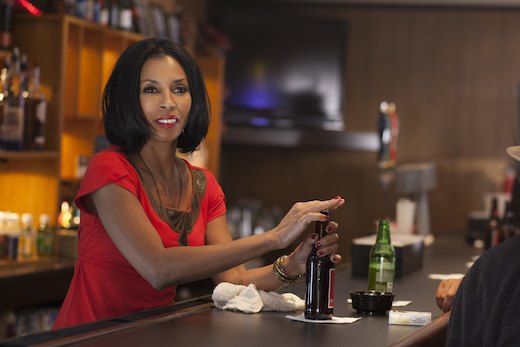 Every good funeral in New Orleans deserves a mournful, funky and deeply felt second line parade, and so it was with “Treme” Sunday.
Every good funeral in New Orleans deserves a mournful, funky and deeply felt second line parade, and so it was with “Treme” Sunday.
The loving and incisive meditation on America’s unique city amid its post Katrina recovery, created by David Simon and Eric Overmyer, came to a close after an extremely abbreviated five-episode fourth season.
As in the city, the unique New Orleans sounds emanate from every corner of the series, and often take their time to get in their grooves. And the finale took its time as well in wrapping up or advancing nearly all of its storylines.
But to do so it had to extend the normal hour to 75 minutes, like an extended coda to a blissful song.
As the episode begins, there is a literal funeral, for Clarke Peters’ Albert Lambreaux; the Big Chief didn’t make it to Mardi Gras as he thought he would and expired even as he was barking out further repairs to the house he’s been adamant to rebuild since the hurricane blew through and the series started in 2010.
The Mardi Gras Indian chants that help send him home set a basis for New Orleans music just as it laid groundwork for the very musical episode that kept switching from character to character.
Among them, Steve Zahn’s Davis, still dazed from turning 40, offers to be sommelier at Janette Desautel’s still-unnamed restaurant. He and Janette, played by Kim Dickens, have lately been hooking up again, and even she is worried about his wearing a suit and tie and becoming Mr. McAlary instead of DJ Davis.
David Morse’s clean cop Colson finally gets his transfer approved, but it doesn’t keep him from testifying on department misconduct before a grand jury.
Jon Seda’s Hidalgo is signing papers on a big land deal that may or may not include the jazz center he’s been working on; he’s on his way out of town, too — back to Houston.
Just as Antoine Batiste’s high school band is sounding fine, his ex, LaDonna comes to visit – would he mind taking their boys over the summer as saves money in hopes of finding her own place? Wendall Pierce’s character is a soft touch.
And his largess is rewarded another way: He finally gets a call from Dr. John to play a gig with him. He takes his boys along and they don’t complain or retreat into their phones, they actually like the music.
Lucia Micarelli’s Annie Tee is off to Nashville recording her new album, as many suggested, but she ends up hating the slick sound there and puts her foot down. Later, back in New Orleans, she sends out a song to her ex, Michiel Huisman’s Sonny, who has been seen the least in recent episode as he got married and ingratiated himself into her family of Vietnamese fishermen. Still, she takes him out to clubs to see the music he clearly misses (and so he can make the finale!).
Chris Coy’s investigative reporter L.P. Everett is only recently back in town, but even the local Times-Picayune admits that readers won’t be interested in anything he digs up. When the chief is paraded away in cuffs, it’s likely more of Colson’s doing.
Poor Colson had to drive out of town with Professor Longhair’s “Go to the Mardi Gras” faltering from WWOZ’s fading signal. Dancing to that same tune, just as they did when their dad (and the series biggest star, John Goodman) was around, were Melissa Leo’s lawyer Toni and her daughter.
As Mardi Gras approaches, Rob Brown’s Delmond Lambreaux is mourning his pop, putting those finishing touches on his house, and playing some big name jazz gigs in New York before returning and taking the Big Chief’s costume, this year at least, as his father suggested. He’s still working out that somber mourning song.
Davis shows that his suit and tie experiment is partly an experiment, he baptizes himself in the big river and by the end is the ace DJ and parttime musician he had been, writing another bad concept album on the subject of “Godzilla vs. MLK.”
Shots ring out at the Mardi Gras — we never find who’s hit, if anyone, but Khandi Alexander’s LaDonna rushes to find her boys, who are fine.
In other last minute conclusions, a Hidalgo-brokered truce between Janette and her former employer means that she gets to put her name on her restaurant.
Davis is back on the radio and passes the pothole that got him so riled in season one that he ran for city council. The thing is still not fixed but the barricade has been long since decorated by passerby and Davis makes his peace with it: Another local eccentricity of the town to embrace.
What hasn’t been resolved is reviewed in a long coda, from births to graduations, as a full, gorgeous version is played of “Do You Know What It Means to Miss New Orleans?” plays.
Yes, we know what it means. It’s the same feeling we have now that this well-done series and these characters are gone for good.